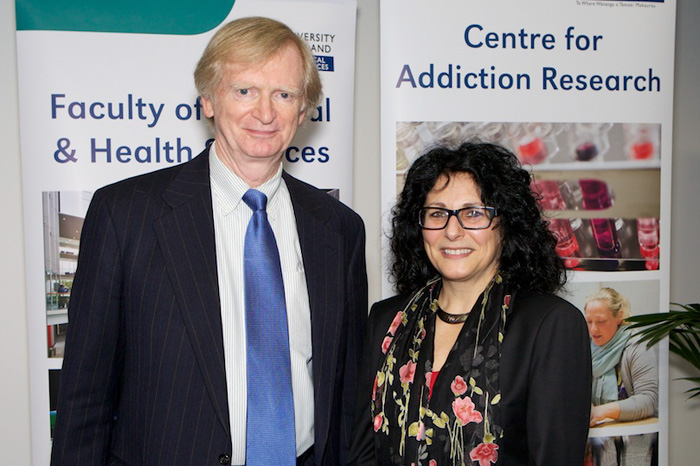
Longtime UConn Health Center addiction researcher Thomas Babor is known worldwide for his study of problems associated with alcohol and illegal drugs—so much so that he was invited to New Zealand to join the country’s associate minister of health for the opening of the University of Auckland’s Centre for Addiction Research.
The last time Babor, professor and Health Net, Inc. Endowed Chair in Community Medicine and Public Health, was in New Zealand, he was testifying before a parliamentary committee making the case for raising the drinking age from 18 to 20.
That was three years ago. Last month he spent a rigorous two-week visiting fellowship giving lectures, media interviews, presentations at hospitals, and a keynote address at the official opening of the Centre for Addiction Research Aug. 9.
“New Zealand has a serious problem with the misuse of alcohol and drugs,” Babor says. “The hope is to have a health system that can be more responsive to that. By establishing the Centre for Addiction Research, they’re setting up a capability for doing policy-relevant research. New Zealand, like a number of other countries, is becoming much more interested in what the scientific research says about how they can deal with alcohol and drug problems.”
Babor says the country is heading down a path of great interest and relevance to his research, and it’s something he’s watching closely.
“I learned an awful lot from being in New Zealand and seeing what they’re doing. It’s perhaps the first country in the world proceeding toward legalization of certain recreational drugs for ‘legal highs,’” Babor says. “If this is a way of legalizing substances people can use to get high, the profit motive enters the situation. If that happens, not only is it fulfilling a small demand that may already exist, it is also likely to create a new demand through marketing and product innovations. It’s what we’ve seen with alcohol and tobacco when the profit motive enters. The commercial market is not a good way to protect public health.”
Peter Adams, the new center’s associate director, says the visiting professorship is designed to bring leading thinkers in medical and health sciences to New Zealand to share their research insights and expertise with academics, practitioners, policymakers and students.
“We nominated Professor Babor for this role not only because of his international recognition as a leading researcher in the alcohol and drug field, but also because of the breadth of his contributions which spanned alcohol and drug treatment, ethical issues, primary health interventions and public policy,” Adams says. “We saw him as bringing a highly valued global perspective to discussions and seminars on current issues in New Zealand, particularly given our recent alcohol policy reforms, issues with addiction treatment approaches and concerns about liquor industry influence in public health debates.”
Babor says the nomination was an honor.
“To the extent other countries are interested in what I’m doing, it’s one of the best things that someone who does research can have happen,” Babor says. “Instead of your work collecting dust in a library, they’re taking what you’ve written and applying it to their situation, using science to influence health policy.”
Regarding the drinking age in New Zealand, it’s still 18.
“We came close,” Babor recalls from his 2010 trip. “Politics killed it. It would have saved many lives.”
Follow the UConn Health Center on Facebook, Twitter and YouTube.


